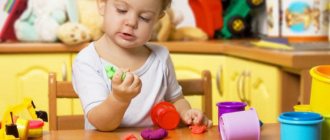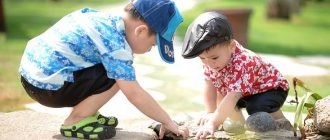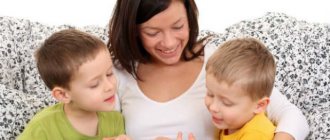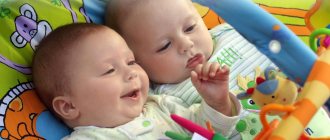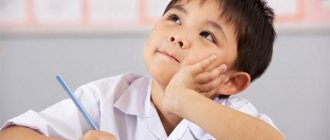Development of communication skills in preschool children
Epova Galina Petrovna
Development of communication skills in preschool children
At preschool age, a child takes his first independent steps in the complex world of relationships. Consequently, such a problem as the problem of developing the communication skills of preschool children continues to be an urgent problem that needs to be solved by many specialists working with preschool .
A child who communicates little with peers and is not accepted by them due to the inability to organize communication, to be interesting to others, feels wounded and rejected, which can lead to emotional distress: decreased self-esteem, increased shyness in contacts , isolation, the formation of anxiety, or, on the contrary, to excessive aggressive behavior.
Communication is the process of transferring meaningful information, its emotional and intellectual content from the sender to the recipient, i.e. from a person, group to another person, group.
Communication skills are extremely important , since we all live within society and, in one way or another, interact with it and its other representatives. In order to achieve success in work and personal life, we need to be able to communicate correctly and correctly, conduct dialogue, recognize our own and others’ emotions well, and so on.
A child comprehends the world and its patterns to a large extent through communication with the adults around him. Thus, parents and educators bear the main responsibility for the development , including communication skills, of preschoolers .
Communication skills are a person’s ability to interact with other people, adequately interpreting the information received, as well as transmitting it correctly.
a preschool institution , in particular his emotional well-being in the team, largely depends on the level of development of communication skills Their implementation involves the use of various collective ( communicative )
working methods.
The communication skills of preschoolers can be considered in the educational process not only as a condition for the child’s current effectiveness and well-being, but also as a resource for the effectiveness and well-being of his future adult life.
Communication Skills Framework .
Communication skills are a broad category of skills that a child needs to understand the world around him and interact with other people. The development of a child in this direction involves the formation of a number of skills , including:
– well-delivered speech;
– coherent expression of thoughts and feelings;
– understanding non-verbal signals, that is, facial expressions, movements and postures;
– initial teamwork skills ;
– recognition of emotions, empathy;
– attention to the words of the interlocutor;
– ability to conduct constructive dialogue;
– answer questions from peers and older people ;
– knowledge of the basics of etiquette.
Children in whom these qualities are unevenly developed experience certain difficulties in communication. Training activities should be aimed at developing all of the listed skills at the same time, because only an integrated approach will help the child feel like a full-fledged member of the team and an interesting interlocutor.
The development of communication skills in preschool children normally includes:
– development of children’s communication skills in various life situations (with peers, teachers, parents and other people around them)
with a focus on a non-violent model of behavior;
– development in children of skills and abilities of practical mastery of expressive movements (facial expressions, gestures, pantomimes)
– means of human communication;
– development in children of positive character traits that contribute to better mutual understanding in the process of communication;
– development of creative abilities and expression in the process of communicative activities ;
– development of activity , independence, and organizational abilities of the child in the process of communicative activities ;
– correction of undesirable character traits and behavior, since children of primary preschool age are characterized by insufficient development of emotional and expressive means, which complicates the acquisition of communication skills . They cannot always adequately express their thoughts, feelings, and sensations, which is an obstacle to establishing full contact with others, and they experience serious difficulties in communicating, especially with peers.
The formation of sound pronunciation, as a rule, is completed by 4–5 years. The beginning of mastery of the syllabic structure of a word is considered to be the end of the humming stage, when children begin to form a stable syllable.
In the process of mastering the syntactic side of speech, the process of developing the syllabic structure of the word continues. Speech therapist A. N. Gvozdeva established a connection between sentence formation and the development of syllable structure . Thus, according to the scientist, children begin to pronounce sentences that consist of three or more syllables earlier than three-syllable words. Prior to this, polysyllabic words can be abbreviated. The process of assimilation of the syllabic structure of a sentence occurs quite intensively at the age of 2–2.5 years; after 2.5 years, a reduction in syllabic composition is an extremely rare phenomenon.
According to A.N. Gvozdev, linguistic consciousness has a mechanism that is a reflection of the word-formation level of the language, consisting of two levels.
1. The actual word-formation level is a generalized reflection of the ways of forming new words; unit – univerb (model-type for children )
.Here two sublevels can be distinguished: syntagmatic, the unit of this level is nominalized predicative syntagms, and the sublevel of universals.
2. Lexical level, which is represented by a set of lexical units of the language. Units - lexemes - are the result of both the action of word-formation mechanisms and the result of reflection and consolidation of lexemes.
The rules of word formation and, in fact, the development of communicative skills are formed as a result of the interaction of these levels, while at different ages the degree of dominance of each level is different. At later stages, the lexical level takes the leading place, and through the word-formation level, the actualization of universal concepts fixed in the mind is ensured.
As with norms and with pathologies, the development of children's speech and the development of communication skills is a complex and diverse process. Children cannot immediately master sound pronunciation, the syllabic structure of words, lexical and grammatical structure, inflection, and so on. Thus, some language groups can be acquired by them earlier, others much later. Therefore, at certain stages of the development of children's speech, some elements of the language may have already been acquired, while others have not yet been acquired or only partially acquired. This is where such a variety of violations of conversational norms by children appears.
In the process of developing a child’s communicative skills , in the process of his formation of words, a lot changes over time: for example, the means and methods of forming new words, the word-formation character of previously formed words, and so on change.
By the beginning of preschool age, a child is normally already capable of implementing various communicative actions and the corresponding forms of speech utterances. At this age , learning of more complex types of communication , such as storytelling or joint planning. Also, at the age of 3 to 6 years, there is a transition from single or parallel games to combined and corporate forms of play, which are closely related to the development of joint planning - this fact is confirmed in the studies of M. I. Lisina, T. A. Repina.
Most authors, such as R. E. Levina, A. N. Gvozdev, A. K. Markova, N. Kh. Shvachkin and many others, have identified the following violations in the development of communication skills in normally developing children : errors when adding the number of syllables, omissions of syllables and sounds in a word, errors when reducing groups of consonants, rearrangement of sounds and syllables in a word.
Many children do not know how to turn to another person on their own initiative; sometimes they are even embarrassed to respond appropriately if someone turns to them. They cannot maintain and develop established contact, adequately express their sympathy and empathy, and therefore often conflict or become isolated.
Methods and techniques for developing communication skills in preschoolers with speech impairments
Methods and techniques for developing communication skills in preschoolers with speech impairments
The relevance of the problem of developing the ability to communicate in preschoolers is determined by the fact that the number of contacts with the world of adults and peers in a modern child is constantly increasing, and the effectiveness and success of such interactions depends on the level of speech development of children. Skillful command of the native language in various communication situations serves as a means of free communication.
At preschool age, one of the most important “acquisitions” of a child in his communicative development occurs. His circle of contacts is expanding. In addition to the world of adults, the preschooler “discovers” the world of his peers. He discovers that other children are "just like him." This does not mean at all that he did not see or notice them before, but the perception of a peer acquires a special quality - awareness.
By the senior preschool age, the child should already have mastered communication skills. This group of skills consists of well-known skills:
- cooperate;
- listen and hear;
- perceive and understand information;
- speak for yourself.
The communicative competence of a preschooler is largely determined by the development of speech. Speech is one of the most important mental functions, a “mirror” of the flow of mental operations and emotional states; it plays a big role in regulating the behavior and activities of the child. Poorly speaking children, beginning to realize their shortcomings, become indecisive, withdrawn, shy and even aggressive in communicating with others.
Children with speech impairments are in greater need of developing communicative competence. Speech function disorders cannot but have a negative impact on the development of the process of communicative competence. Such a developmental deviation as a general underdevelopment of speech, which is accompanied by the immaturity of certain mental functions and emotional instability, indicates the presence of persistent violations of the communicative act, which in turn makes it difficult, and sometimes even impossible, for the development of children’s communicative competence. Underdevelopment of speech means reduces the level of communication, contributes to the emergence of psychological characteristics, and gives rise to specific features of general and speech behavior.
In our group, children have general speech underdevelopment. In children, there is a persistent lag in all components of the speech system. This contributes to the emergence of psychological characteristics. Shyness, self-consciousness, indecisiveness, timidity, and reticence are noted, which in turn gives rise to specific features of general and speech behavior. Children show limited contact, slow involvement in a communication situation, do not know how to maintain a conversation, cannot correctly assess their capabilities and strengths, and often “fall out” of the system of real relationships with others, which inevitably leads to a decrease in their communicative activity.
The mental characteristics of children listed above negatively affect their speech activity, which leads to a limitation of the process of free communication and does not contribute to the development of speech-thinking and cognitive activity of children, preventing the acquisition of knowledge.
The main directions of corrective action are:
- development of non-speech and speech means of communication;
- developing the ability to use means of communication in a variety of communicative situations;
- development of activity in various forms of communication;
- the formation of certain forms, properties and qualities of the individual (for example, the ability to follow the rules of behavior).
Communication skills are a condition for the development of children's personality and are manifested in the process of communication, ensuring the readiness to build relationships in a certain style and with a certain type of preferred partners.
The process of forming a full-fledged communicative activity should be built on the basis of taking into account the leading activity - gaming.
The work is carried out in the form of play therapy, since play is the leading activity in preschool age, and also allows the child to develop and interact with the outside world, with peers and adults. One of the most effective forms of interaction between children is joint communicative games, in which children act simultaneously and in the same way. The absence of a competitive element in such games, the commonality of actions and emotional experiences create a special atmosphere of unity and closeness with peers, which has a beneficial effect on the development of communication and interpersonal relationships.
Games for developing the ability to establish contact with an interlocutor. Children are offered the following game exercises:
“Smile” - give everyone the kindest smile you can.
“Compliment” - praise your neighbor, looking into his eyes, say the kindest words.
Situations: “The guys are playing an interesting game. Ask to be accepted into the game."
Games for improving children’s ability to communicate without words: “Guess what we are doing?”, “Who walks, how?”, “Let’s tell a story silently.”
Games for expressive speech: “Imagine how the sea rages”, “What voice do Cinderella and Baba Yaga speak in.”
Games for developing skills to behave in a conflict situation, we analyze various communication situations with children. “You offended your friend. Try to ask for forgiveness”, “The guys don’t want to take you into the game, what will you do”, “Two boys quarreled, how to reconcile them.”
Games for developing empathic behavior: “Magic Store” - choose a gift for your best friend; “Princess Nesmeyana” - let’s try to make her laugh.
We involve children and adults in the dramatization of fairy tales. Communication situations: “You found a hungry kitten on the street, have pity on it,” “The baby is crying, how to calm him down.”
We invite children to visit us for joint play and communication.
As the main methods and techniques aimed at developing the communicative sphere, in classes and in everyday activities we use:
— communicative games-exercises;
- conversations on various topics;
— communication situations, acting out and solving “difficult” situations;
- games with words;
- round dances, dances, theatricalization of fairy tales;
— reading and joint discussion of works of art;
- playing up the emotional state;
— sports, outdoor games;
— joint holidays, entertainment, relaxation evenings for children and adults.
In the course of improving children's communication skills, one should, first of all, take into account that not only teachers, but also parents take part in this process. Parents improve their ways of communicating with their child in the direction of personality-oriented interaction with him. It is necessary to cooperate with parents on the development of communication abilities in children.
At meetings, we raise issues of interest to parents, jointly discuss issues of relationships between adults and children, play out various situations, offer communicative games that will help form and maintain adequate self-esteem in children, teach them how to enter into a conversation and maintain it.
We conduct individual conversations: “How to properly teach a child to communicate”; "Shy Child" “How to deal with an aggressive child”; “Child’s self-esteem”, etc.
The organization of joint holidays and entertainment plays a major role in forming the cohesion of the team of parents, children and teachers. In the program of each event we include a theatrical performance or dramatization of a fairy tale in which children and parents participate. This promotes team cohesion, the authority of parents rises in the eyes of children, and parents get to know their children better and see their relationships with peers.
My parents and I have a common goal - to make our children happy, to create an atmosphere of joy, to ensure every child’s right to invention and fun. Only in such an atmosphere can personality be formed, children’s social circles expand, and self-esteem increases.
In our group, we discuss with children certain facts and cases that take place in their communication with peers in joint activities, encourage them to express their attitude towards the actions of this or that child, to compare their actions and the actions of their peers. We talk about how to act towards each other and how to talk to each other when any joint activity is organized, for example, a game. It is necessary that children take into account the right of each child to participate in a joint game, be able to ask their peers in a friendly and friendly manner to play together, and respond cordially to a friend’s request to take him into the game. We also discuss with them the form of refusal, teach them to express disagreement tactfully, and politely respond to refusal. When addressing a peer with a proposal, we encourage children to: look at him, call him by name, listen carefully to the answer. We draw children's attention to the inadmissibility of rude, harsh addresses and responses that express disdain for the interests and desires of a peer.
The development of communicative abilities is facilitated by the technique of children writing a story together: one child begins the story, the second continues it, and the third completes it. Children choose their partners themselves, agree on the content and order of storytelling. This could be an essay on a painting, a series of paintings, a set of toys, or a nursery rhyme.
Joint visual activities, design, and manual labor also provide ample opportunities for establishing dialogical communication between children. And even when the child performs individual work, he comments on his actions, addresses his neighbors with exclamations and finds a response in the form of similar manifestations of his partner.
Children always have educational board games at hand: lotto, dominoes, route (maze), cut-out pictures. All of them are based on the interaction of the players. Children learn to reason and independently find solutions to cognitive problems.
For the development of communication with peers, we attach particular importance to verbal didactic games with small subgroups of children (2-3 people). In these games, cognitive tasks are set based on language material, and the rules organize the relationships between children. The rules encourage you to listen and hear your partner, ask him questions, give instructions, give instructions, express agreement or disagreement with the partner’s game speech actions, give reasons for the statement, observe the order, and respond to the interlocutor’s statements.
The expressiveness of speech allows the older preschooler to express himself more clearly in different types of activities; it characterizes not only the level of formation of children's speech, but also the personality traits of the older preschooler: openness, emotionality, sociability. Expressiveness has a wide influence on the communicative culture of the individual, relationships with others, and self-expression in various types of creative activity.
In the course of systematic work to develop communicative abilities, our students develop an emotional and motivational attitude towards themselves, others, peers and adults. They acquire the skills, abilities and experience necessary for adequate behavior in society, contributing to the best development of the child’s personality and preparing him for life.
Municipal budgetary preschool educational institution "Kindergarten of a combined type "Golden Key" of the city of Anadyr"
SPEECH ON THE TOPIC:
«Methods and techniques for developing communication skills in preschoolers
with speech impairment"
Prepared by
speech therapist teacher: Stebeneva E.V.

